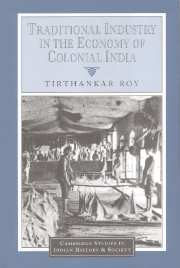8 - Conclusion
Published online by Cambridge University Press: 05 July 2009
Summary
The examples studied in chapters 3 to 7 suggest three general points. At a purely empirical level, they suggest that major types of traditional industry in colonial India experienced ‘commercialization’ and, as a result, experienced changes in their organization, which on the whole improved their capability. The examples also bear on two analytical problems: the historical roots of underdevelopment, and the distinction between ‘modern’ and ‘traditional’ elements in Indian industrialization. In relation to the first, the book disputes an influential belief that exposure to free trade destroyed or devitalized the Indian artisan, and, in this way, was regressive in its impact on the economy of colonial India. The transition outlined here is not qualitatively very different from the experience of traditional industry during the early stages of industrialization in Western Europe or Japan. It follows that the roots of underdevelopment in South Asia cannot be found in some special distress that trade or markets caused only in South Asia. Rather, the roots should be sought in those specific South Asian conditions that prevented industrialization from securing rapid growth in average incomes. These conditions might be rapid population growth or social backwardness.
In relation to the second problem, the belief that colonialism devitalized traditional industry implies that ‘modern’ and ‘traditional’ industries are essentially different, unrelated, and incompatible species. This, in effect, is the view of the Marxists, as well as that of many of their critics.
- Type
- Chapter
- Information
- Traditional Industry in the Economy of Colonial India , pp. 231 - 235Publisher: Cambridge University PressPrint publication year: 1999

